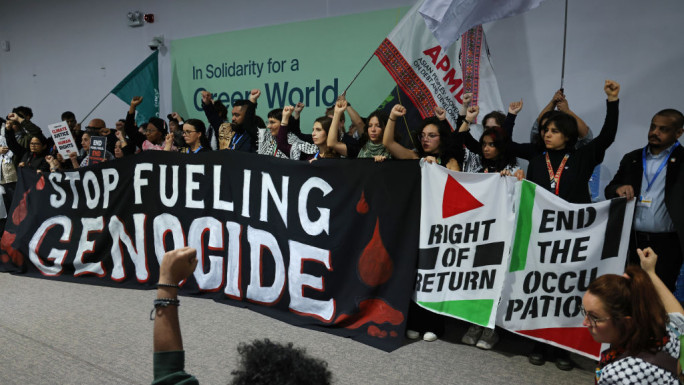
Labour: a loyal friend to Israel
Among the possible outcomes of the UK election on 7 May are a Labour victory, a minority Labour government, and a Labour-led coalition government, all of which would make Ed Miliband prime minister. What would that mean for UK policy toward the Israel-Palestine conflict?
| Miliband's differences with Cameron are likely to vanish once Labour gain power. |
There is an obvious difference between the rhetoric of the Labour party and the Conservative-led government over the past five years, with the government strongly supporting Israel throughout, and the Labour opposition showing more willingness to be even-handed.
This reflects the backbench and grassroots pressure on the Labour leadership on Palestinian rights, which is largely absent in the Conservative party.
During Israel's assault on Gaza last summer, dubbed Operation Protective Edge by the Israelis, Ed Miliband decried the lack of response from Prime Minister David Cameron to the huge loss of civilian life as "inexplicable".
Later in 2014, Miliband was again in opposition to the Conservatives' Middle East policy when he urged Labour MPs to back a parliamentary vote recognising a Palestinian state, and supported Palestine's application for enhanced observer status at the UN.
But these differences are ultimately superficial after scratching the surface. Miliband vehemently opposes a boycott of Israel, supports negotiations under US auspices and generally adopts Israeli propaganda to inform his public statements on the conflict (he supports "Israel's right to defend itself" against Hamas "terrorists," opposes the "delegitimisation of Israel").
His statement on Gaza last year was devoid of historical or regional context and presented the Israeli side as victims of an unprovoked aggression from Gaza.
Already displaying an Orwellian ability to subvert reality in the Middle East, Miliband's differences with Cameron are likely to vanish once Labour gain power. Miliband's predecessors Gordon Brown and Tony Blair were strong and in Brown's case fervent supporters of Israeli hegemony.
Under New Labour, UK policy followed an increasingly pro-US and pro-Israel agenda in the post-9/11 Middle East.
Labour's distance from the ideals of international socialism is most obviously exemplified by Blair's criminal invasion of Iraq and subsequent lucrative roles as an advisor to various dictatorships. Miliband's brother, David, as Labour foreign secretary, failed to distinguish himself, and approached the Middle East as a valuable market for British weapons rather than a region in desperate need of an honest broker.
On the key issue of the 2006 Palestinian elections, in which Hamas swept to victory, the Labour government conspired with the US, Israel and the Fatah-dominated Palestinian Authority to overthrow the elected government and sponsored the training of security forces who worked to widen the ongoing Palestinian schism.
When Israel launched Operation Cast Lead in 2008, David Miliband's response was abject, amounting to tacit approval.
With such recent history, expect little serious change if the younger Miliband becomes prime minister. UK Middle East policy will remain in lockstep with US policy and dogma.
Although the official UK position may be within the slightly more progressive European parameters, in reality the UK's extensive economic, military and intelligence ties to Israel and the impressive donations given to the parties by Zionist donors are the real bottom line.
An inch to the left of the conservatives
| The issues that would make a serious difference to Palestinians are unlikely to be challenged by Labour under Miliband. |
And it is also worth viewing Labour's prospective approach to Palestine within a domestic context.
Since 2010, Labour has positioned itself an inch to the left of the right-wing Conservatives on every major issue - the economic crash, so-called austerity measures, tuition fees for students, the housing crisis, Syria and more - and while Miliband has taken opportunities to score political points from the Conservatives, as he did over Gaza, such occasions represent opportunism and not significant ideological difference.
The issues that, if tackled, would make a serious difference to Palestinians, including the occupation, protection of Jerusalem, the right of return for seven million refugees, the siege of Gaza, Israel's racist policies and the ongoing freezing out of Hamas, are unlikely to be challenged by Labour under Miliband.
This would represent a missed opportunity for Britain to begin taking responsibility for the historic injustice it started by signing over the land of the Palestinians to a third party, and a missed chance to refresh the UK's image after such a bloody history of foreign invasion.
Don't expect anything but the status quo under Ed Miliband, despite the presence of some voices for justice within his party; it may be his partners in a coalition or minority government that make the most effective case for a new approach to Palestine.
Tom Charles is a London-based writer, editor and literary agent. He previously worked in the UK parliament, including as a lobbyist for Palestinian rights. He has contributed to Jadaliyya and the Journal of Palestinian Refugee Studies.






 Follow the Middle East's top stories in English at The New Arab on Google News
Follow the Middle East's top stories in English at The New Arab on Google News


